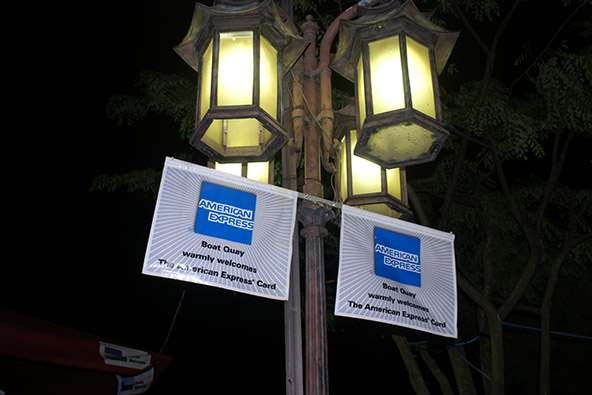How Much Does It Cost You to Accept American Express Cards?

Among the four major U.S. payment brands, American Express charges the highest credit card acceptance fees, by far. So much so that many retailers choose not to take AmEx cards at all, taking the risk of losing sales altogether in the process. Of course, for decades merchants have tried very hard to force American Express to lower its rates and in fact they’ve had some successes. The retailers scored their biggest victory in 1991, in the aftermath the “Boston Fee Party” — a protest that was orchestrated and paid for by a PR firm hired by AmEx’s rival Discover and which was joined by more than 250 restaurants across the U.S. American Express was eventually forced to gradually reduce its fees, which at the time averaged at around 4 percent. Yet, the difference between AmEx and Visa / MaterCard fees remains quite substantial.
In its latest annual report, AmEx told us that its average discount rate in 2012 was 2.52 percent, slightly below 2011’s level of 2.54 percent and 2010’s average of 2.55 percent. A direct comparison with Visa and MasterCard is not possible, as neither association releases average rates just for credit cards (credit and debit cards are lumped together) and AmEx doesn’t issue debit cards. However, the Nilson Report — a payments industry newsletter — told us a while back that in 2008 the weighted average for each of the two associations was below 2 percent and today it is almost certainly lower than that. But let’s take a closer look at American Express’ merchant fee structure.
American Express Merchant Fees
Merchants which accept American Express are charged a discount fee for each card transaction (except those signed up for the monthly flat fee plan, as we’ll see in a bit) and may be subject to various other fees and assessments. Some of the additional charges are assessed for special products or services, while others may be applied because of a merchant’s non-compliance with AmEx’s policies and procedures. American Express’ fees are stated in each merchant’s processing agreement. Following is a list of all fees, with description and amount (all current at the time of writing).
1. Card acceptance discount fees. AmEx uses two different pricing plans: a discount rate plan and a flat-rate one:
A. Discount rate — the amount American Express charges merchants for accepting their cards. The amount varies, as shown below.
|
Industry |
Discount |
Prepaid / Gift Card |
|
B2B |
2.89% plus $0.15 Transaction Fee* |
1.95% |
|
Education |
2.50% |
1.95% |
|
Fast Food Restaurant |
3.50% |
1.95% |
|
Independent Gas Stations |
3.25% |
1.95% |
|
Lodging |
3.50% |
1.95% |
|
Mail Order & Internet |
3.50% |
1.95% |
|
Office-based Healthcare |
2.55% (only for MCC 8011 and 8021; for all other Healthcare see Services, Wholesale & All Other) |
1.95% |
|
Other Transportation |
3.50% |
1.95% |
|
Restaurant** |
3.50% plus $0.05 Transaction Fee* |
1.95% |
|
Retail** |
2.89% plus $0.10 Transaction Fee* |
1.95% |
|
Services, Wholesale & All Other |
2.89% plus $0.15 Transaction Fee* |
1.95% |
|
Supermarkets |
2.30% |
$0.20 Transaction Fee* |
|
Telecommunications |
3.50% |
1.95% |
*Fee to be applied by American Express.
**0.30-percent downgrade is charged by American Express for transactions whenever a CNP (card-not-present) charge occurs. CNP means a charge for which the card is not presented at the point of purchase (e.g., charges by mail, telephone, fax or the internet).
An inbound fee of 0.40 percent is applied to any charge made using a card issued by an issuer located outside of the United States. This fee is applicable to all industries listed above, except Education in the following categories: Sporting & Recreation Camps (MCC 7032), Elementary & Secondary Schools (MCC 8211), Colleges, Universities, Professional Schools (MCC 8220) and Child Care Services (MCC 8351). Furthermore, the inbound fee is not applicable to international prepaid / gift card transactions.
B. Monthly flat fee — $7.95 per month. If American Express charges the merchant a monthly flat fee, it will be instead of charging a discount rate. This is an alternative option available to smaller merchants, with an estimated annual American Express transaction volume of less than $4,999. Upon exceeding the $4,999 transaction limit in any consecutive 12-month period, the merchant’s pricing will be automatically switched to the standard discount rate pricing.
Merchants in the following industries are required to be set up on monthly flat fee, regardless of their estimated processing volume:
- Internet-Physical Delivery merchants.
- Mail Order / Telephone Order (MO / TO).
- Home-Based Businesses.
2. Authorization fees:
- Gateway fees — vary (about $0.001 per charge or so). If the merchant’s authorization requests are routed through the Visa or MasterCard processing gateways, AmEx passes the associated fees to the merchant.
- Non-swiped transaction fee — 0.30 percent of the transaction amount. This fee is applied to any transaction for which AmEx did not receive both the full magnetic stripe-read data from the card and the indicator as to whether the card was swiped.
- Voice authorization fee — $0.65 per request. If the merchant’s point-of-sale (POS) system is unable connect to American Express’ electronic authorization system, the merchant is required to call the company and obtain a voice authorization.
3. Submission and settlement fees:
- Check fee — $1.50 per check. This is a fee assessed for any check issued or created by AmEx.
- Paper statement fee — $7.95 per statement. This fee is assessed if the merchant chooses to receive paper statements, rather than the default electronic ones.
- Technical specifications non-compliance fee — $0.10 – $1.00 per transaction. This fee applies to any charge submitted to American Express that does not comply with their technical specifications.
- Monthly gross pay fee — 0.03 percent of the transaction amount. This fee is charged to merchants enrolled in the monthly gross pay option, if the transaction amount exceeds a pre-determined threshold amount.
- Inbound fee — 0.40 percent of the transaction amount. This fee is applied to charges made with cards issued outside of the U.S.
4. Data security fees:
- Data incident management fee — not to exceed $100,000 per data incident. This is a fee assessed to a merchant in respect of a data security incident.
- Data security non-validation fee — $5,000 – $45,000. Depending on the merchant’s transaction volume, the merchant has reporting obligations under AmEx’s Data Security Operating Policy, such as providing Validation Documentation. Failure to do so can result in the assessment of the non-validation fee.
5. Data pass violation fee — $2,500 – $50,000. This charge can be applied if AmEx determines that its requirement for transaction data to be provided directly by the cardholder is violated.
6. Excessive dispute fee — $5 per disputed transaction if the merchant is in the Immediate Chargeback Program or $15 per disputed transaction if the merchant is not there. This fee is applied if in any three-month period a merchant’s monthly ratio of disputed transactions to total transactions (minus credits) exceeds three percent, and then in any month when the merchant again exceeds this ratio. It is applied for each disputed transaction in excess of this ratio.
7. American Express Merchant Regulations fee — if a merchant orders AmEx’s Merchant Regulations, it is charged $22.50 for a paper copy and $8.00 for a CD-ROM.
The Takeaway
So yes, American Express cards are considerably more expensive to accept than those of the other major brands. Yet, as I keep telling retailers, it doesn’t hurt having the option switched on into your merchant account, even if you don’t intend on taking AmEx in the immediate future. After all, it doesn’t cost you anything, as there are no monthly fees involved. However, if at some future point you decide that not taking these cards actually costs you more in terms of lost revenues than it saves you in unpaid fees (which is likely to be the case), you can simply add the AmEx logo to your checkout and start taking their cards. But the choice is yours.
Image credit: Flickr / alex.ch.



Thanks for posting this valuable info. Last month I offered my Amex card for payment on a motor vehicle. The seller (used car lot) said only if I paid the Amex fees. I did not buy there, after all.
You would have received a better deal if you paid cash.
A motor vehicle dealer cannot afford to give away another 3% to AMEX after he’s already been screwed down on price.
If you base your vehicle purchase on which dealer accepts AMEX the purchaser ends up to be the loser, hands down.
You cannot blame the dealer. Big business like Amex is majorly screwing over the little guy.
https://www.motherjones.com/politics/2013/06/consumers-get-screwed-scotus-american-express-decision-small-biz/
https://www.mytotalretail.com/article/american-express-merchant-fee-case-going-supreme-court/
Mother Jones is hyperpartisan/opinion. Sourcing is not recommended to back up an objective statement.